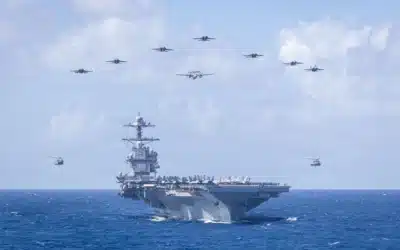A key international agreement that allows food products to be shipped from Ukrainian ports is at risk of not being extended. The deal helped to push the country’s grain exports closer to prewar levels.
After Russia invaded its neighbor in February, Ukraine’s ports became inaccessible because of Kiev’s water mines and Moscow’s warships. Turkey and the UN brokered an agreement in July to allow commercial ships to safely transport food products from Ukrainian ports, marking the only successful diplomacy between Kiev and Moscow to date.
On Monday, a top Russian office met with UN representative Martin Griffiths in Moscow. Col. Gen. Alexander Fomin, the Russian deputy defense minister, told Griffiths that the Kremlin believes the West is not living up to its commitments in the agreement.
In a statement posted on Telegram, the Russian Ministry of Defense said “the possibility of extending the Black Sea Initiative directly depends on ensuring the full implementation of all the previously reached agreements.”
In September, Russian Foreign Minister Sergei Lavrov argued the West was refusing to remove sanctions which interfered with the shipment of Russian agricultural products, saying “Our Western colleagues are not doing what we were promised by the UN Secretary-General. They are not taking decisions to remove the logistic sanctions that prevent the free access of Russian grain and fertilizers to world markets.”
While the White House has made some effort to encourage American importers to buy Russian fertilizers amid growing shortages linked to the war and related sanctions, many companies have avoided trade with Moscow out of fear of being targeted by the US Treasury Department.
Both Russian President Vladimir Putin and his Turkish counterpart Tayyip Erdogan have noted other issues with the agreement. In September, Putin observed that most of the food exports were going to wealthier countries that sanctioned Russia, rather than low-income nations.
Despite fierce fighting ongoing in Eastern Ukraine, the grain agreement has succeeded in moving tens of millions of tonnes of food products from the country, allowing exports to reach levels approaching normal. During the first two weeks of October, grain shipments were only down 2.4% compared to the same period last year.
Moscow offered suggestions on resolving its issues and extending the agreement. “The parties reviewed in detail the implementation of the project for the exportation of grain from Ukrainian ports in direct connection with the implementation of the agreements on the exportation of Russian agricultural products and fertilizers,” the Defense Ministry statement said, adding “UN initiatives on prisoners of war and the promotion of Russian ammonia to the world market using the available infrastructure were also discussed within the meeting.”
The UN floated the idea of extending the agreement to ammonia in September, with Chief Executive Ed Weiner stating “The absence from the market of Ammonia formerly shipped through Ukraine has caused substantial hardship in countries dependent on that product. We believe that resumption of shipments will help to stabilize fertilizer prices worldwide and to avoid a global food crisis.”
Kiev says it is open to continuing the existing agreement, which is set to expire at the end of November, though it remains unclear if Ukraine will accept the Russian alterations to the deal.

































